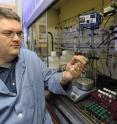UD prof helps discover new chemical method important to drug design, agrichemicals
University of Delaware scientist Donald Watson is part of a research team that has discovered an easier method for incorporating fluorine into organic molecules, giving chemists an important new tool in developing materials ranging from new medicines to agricultural chemicals. The research, which is reported in the June 25 edition of Science, was led by Stephen Buchwald, the Camille Dreyfus Professor of Chemistry at the Massachusetts Institute of Technology.
Watson worked in Buchwald's lab at MIT as a postdoctoral research associate prior to joining the UD Department of Chemistry and Biochemistry as an assistant professor this past September.
About 25 percent of pharmaceuticals contain fluorine, according to Watson, but it's difficult to incorporate the element into drug molecules. Numerous researchers have been working to develop general methods to introduce fluorine atoms into organic molecules under mild reaction conditions.
"The introduction of fluorine atoms into a pharmaceutical compound can have pronounced effects," Watson notes. "They can modulate the uptake of the drug and stabilize it against metabolism by the body, keeping it in a person's system longer and making it more effective."
The chemical method discovered by the research team uses a soluble palladium (a precious metal) catalyst to replace a chlorine atom in an aromatic molecule with a trifluoromethyl (CF3) group, which contains one carbon and three fluorine atoms. The process is highly general and occurs under mild conditions, and may become even more economical in the future as less expensive reagents are identified, Watson says.
Watson's role in the research effort was in early stage development. He dissected the complex chemical process into manageable pieces, isolating the first compounds critical to the reaction and demonstrating their effectiveness.
This is the second article in this research field that the team has published in Science during the past year. The work on which the first article is based will result in Watson's first patent, co-authored with colleagues at MIT.
Today, in his laboratory at UD, Watson works on developing homogeneous transition metal-based catalysts for use in organic chemistry. He hopes the processes that he is discovering will find use in pharmaceutical, agrichemical, and alternative energy research.
His aim is to help build the chemist's toolkit, providing tools -- in the form of chemical reactions -- that other chemists can use to make new molecules.
"In my lab we do basic science that has the potential for real-world applications," Watson says. "We're working with the nuts and bolts, getting to develop stuff that other scientists can use. It's exhilarating to do research that will impact the way chemists build molecules.
"Making molecules and new catalysts is exciting," he adds. "To be able to sketch out a new compound and then make a new substance is a unique experience. It's pretty thrilling to be able to create new substances that other people have never seen before."
Watson has a growing laboratory group, with three graduate students, an undergraduate student, and a laboratory assistant.
"They are an incredible group of hard-working and highly talented students, and their science will have an impact," he says.
He knows that the experience in his lab has the potential to transform their lives just as his lab experiences did.
As an undergraduate, Watson explains, his interests were torn -- would he pursue physics, chemistry, or chemical engineering? Then as a sophomore in college he got involved in laboratory research in organic chemistry. The opportunity to work on something someone hadn't worked on before hooked him.
"I really like having undergraduate and early graduate students in the lab with me now," Watson notes. "Being able to work with young scientists who are just getting started is very rewarding. I hope that I will be able to show them how exciting and important this field is. Being able to return that favor to others is a great privilege in this job."
Source: University of Delaware
Other sources
- Prof Helps Discover New Chemical Method Important to Drug Design, Agrichemicalsfrom Newswise - ScinewsThu, 24 Jun 2010, 21:00:16 UTC
